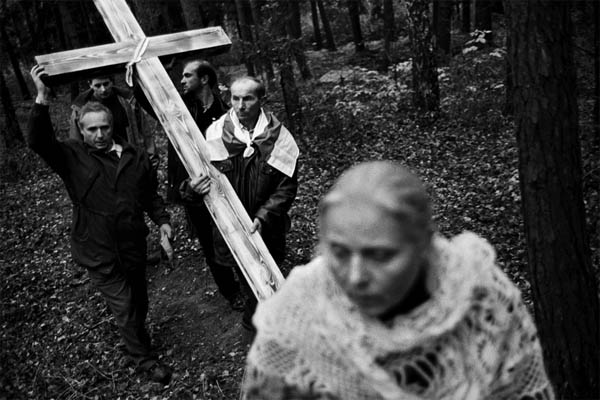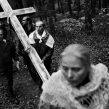
September 17 and the Roots of Contemporary Belarus
Publication: Eurasia Daily Monitor Volume: 6 Issue: 173
By:

The 70th anniversary of the start of the Second World War in 1939 has been commemorated worldwide. Russian President Dmitry Medvedev has denounced revisionism and attempts to belittle the Soviet victory. In Belarus, President Alyaksandr Lukashenka commemorated September 17 as the pivotal date in the foundation of the modern state, and speakers at a conference at the House of Officers requested that it be added to the calendar of state days of remembrance.
The Lukashenka regime, like its Russian counterpart, is notable for its selective memory. Having remained in power as a result of manipulated referendums and elections, it has deployed the war as its foundation stone of legitimacy. The national holiday is July 3 (established in 1995), the date of Minsk’s liberation from the Germans in 1944. May 9, the Soviet Victory Day, sees the largest parade of the year with the president in attendance. Monuments and museums commemorating the war dominate cities and towns, and the focus is on Belarusian suffering and contributions to the Allied victory.
In 2005, the historical complex Liniya Stalina opened to mark the 60th anniversary of the wartime victory and Belarusian resistance to the German onslaught (www.stalin-line.museum.by). The president regularly watches the reenactments of wartime battles. That no such fortifications existed in the summer of 1941 is immaterial; the museum is simply another myth about the war perpetuated by the Belarusian authorities in order to link Soviet Belorussia to the modern state.
Thus, it is hardly surprising that in his address on September 17, Lukashenka referred to the "liberation drive" of the Red Army to protect native Belarusians and Ukrainians from the Germans by annexing the eastern territories of Poland, following Hitler’s invasion sixteen days earlier. On the "freed lands," he added, were created conditions for a new life as a single territorial unit. The "sovereign and peace-loving state" of today originated on this date seventy years ago (SB-Belarus’ Segodnya, Sept 17).
There was focus elsewhere on the cruelty of the Polish occupation of Western Belarus, 1921-39. Maksim Asipau noted in Vecherniy Minsk that although Belarusians and other national minorities of Poland had been guaranteed equal rights with Poles in political life and in the development of languages and culture, in practice these were not granted, and Belarusian Catholics were forcibly subsumed into Poland. Consequently, Belarusians welcomed the invading Red Army with flowers (Vecherniy Minsk, Sept 17).
Belarusian pro-governmental communist organizations and the Union of Officers held a conference entitled "September 17 -the Day of the Reunion of the Belarusian People," which included several well-known historians, but the interpretation differed little from that of Soviet times. The conference drew up an appeal to the president to recognize September 17 as a national day of commemoration (Vo Slavu Rodiny, Sept 17).
In contrast, a conference held at the Johannes Rau International Educational Center (IBB, a joint German-Belarusian hotel and conference facility) in Minsk, noted the changing interpretations of September 17 over the years. In 1993, for example, in contrast to Soviet writings, textbooks noted the repressiveness of Stalinism. In 2002 there was focus on the Secret Protocols of the Nazi-Soviet Pact, which divided Eastern Europe into spheres of influence between the two dictators, Hitler and Stalin, as well as the arrests and deportation of former Polish officers in February 1940, and Belarusian anger at the transfer of the Vilna region to Lithuania. Historians noted that although the invasion of the Red Army united Belarus, national development was severely retarded under Soviet rule. The conference’s goal was to delineate the reasons for the tragedy in order that it is not repeated in the future (Vecherniy Brest, Sept 17).
The IBB meeting indicates that President Lukashenka’s perception of the start of the Second World War is far from universally accepted in Belarus. Why then does official Minsk echo Moscow in its simplistic interpretation of the start of the war, essentially ignoring the Nazi-Soviet Pact and even suggesting that the Western democracies "nudged" the Germans to attack Poland on September 1? (Vecherniy Brest, Sept 17).
One reason is that the war period legitimizes the current government and allows it to pose as the natural successor to Soviet Belorussia, the republic that bore the brunt of the German attack and the occupation of 1941-44. The sacrifices of Belarusians, it is maintained, combined with the onslaught of the Red Army brought the defeat of Fascism, thus permitting the emergence of the modern state and also the liberation of Europe. Such an interpretation, with its emphasis on patriotism and partisans, endears Lukashenka to wartime veterans, their families and descendants. The war in this way is integrated into the president’s unofficial movement "for an independent Belarus."
In one respect, such manipulation of the past is understandable: any modern nation requires historical myths and World War II was a major tragedy for Belarus (including the loss of its 800,000 Jews). On the other hand, Lukashenka’s speech is tantamount to an exoneration of Stalinist crimes in his homeland. It serves to undo many of the revelations of the Perestroika era, such as the discovery of mass graves at Kurapaty, with up to 300,000 victims of NKVD executions in 1937-40, (https://rzecz-pospolita.com/kuropaty0.php3) including, many historians concur, Western Belarusians "liberated" on September 17.
Kurapaty is a more accurate symbol of the Soviet past than the Red Army’s invasion of Eastern Poland, which led to the infamous parade with the Wehrmacht in Brest five days later.




